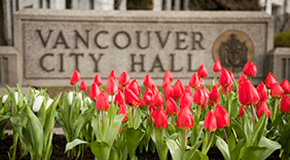IN response to the health crisis, the City of Vancouver is moving ahead with plans to repurpose road space to support recovery efforts. This includes plans to introduce 50 kilometres of “slow streets,” 12 of which have already been installed.
It also includes expediting the permitting process for outdoor patios and restaurants in order to give people the room they need to resume some of their normal activities.
“We know that physical distancing will be in place for some time,” said Lon LaClaire, General Manager of the City’s Engineering Services, on Monday. “As we move through the pandemic and into a phased recovery, more space will be needed to ensure people can safely do the things they need to do like exercising and travelling to work. We also want to help people return to some of the things they really enjoy doing, like eating at a favourite restaurant, picking up items from local businesses or connecting with friends outdoors. We will work closely with businesses and community partners to address needs for space while also ensuring our streets and public spaces remain safe and accessible.”
The City will work with businesses to provide a more efficient application process for patios. Its goal is to provide businesses on June 1, with clear guidelines to expedite their licence applications.
Council is also considering a motion that would ask staff to accelerate the repurposing of road space in neighbourhoods across the city to give people room to move, carry out daily tasks, support business access and connect with others while maintaining physical distancing.
To help support a safe recovery process and advance the City’s goals for streets and public spaces, the City will create more space through the following tools:
Room to Move
– Repurposing parking space and travel lanes on arterials to support physical distancing and important travel connections. This was successfully piloted on Beach Avenue in the West End to complement the closure of Stanley Park to vehicles.
– Turning select residential streets into “slow streets” by allowing local traffic only, which creates space for foot and bicycle traffic.
Room to Queue
– Widening sidewalks for queuing at businesses by repurposing curb lanes. This provides space for people to line up while giving pedestrians room to pass by safely.
Room to Load
– Creating short-term loading/pick-up zones near businesses with high turnover and increased curbside needs.
Staff will also work closely with businesses and residents to understand and respond to needs for additional public space. The City has already piloted innovative public spaces like parklets, public plazas, and curbside patios over the last several years. This initiative will build on those successful spaces to support the community to enable physical distancing during the pandemic recovery phase.
Many other cities around the world are also repurposing road space to allow for physical distancing.
Staff’s presentation to Council can be found here.










